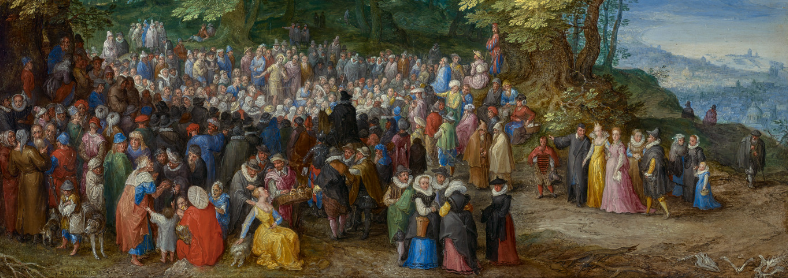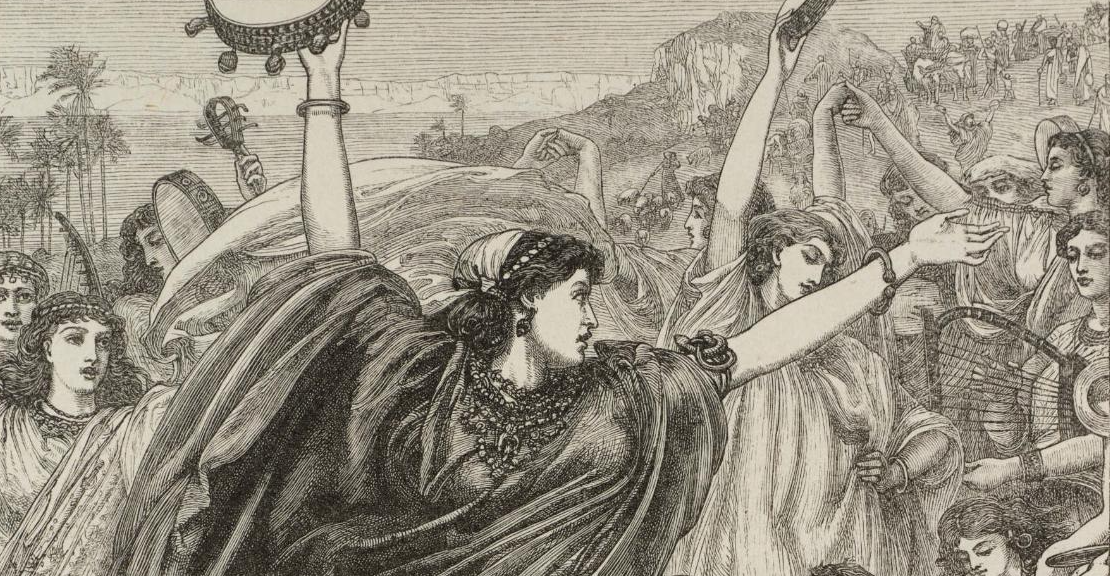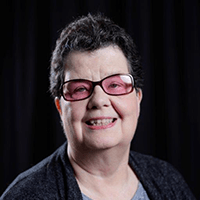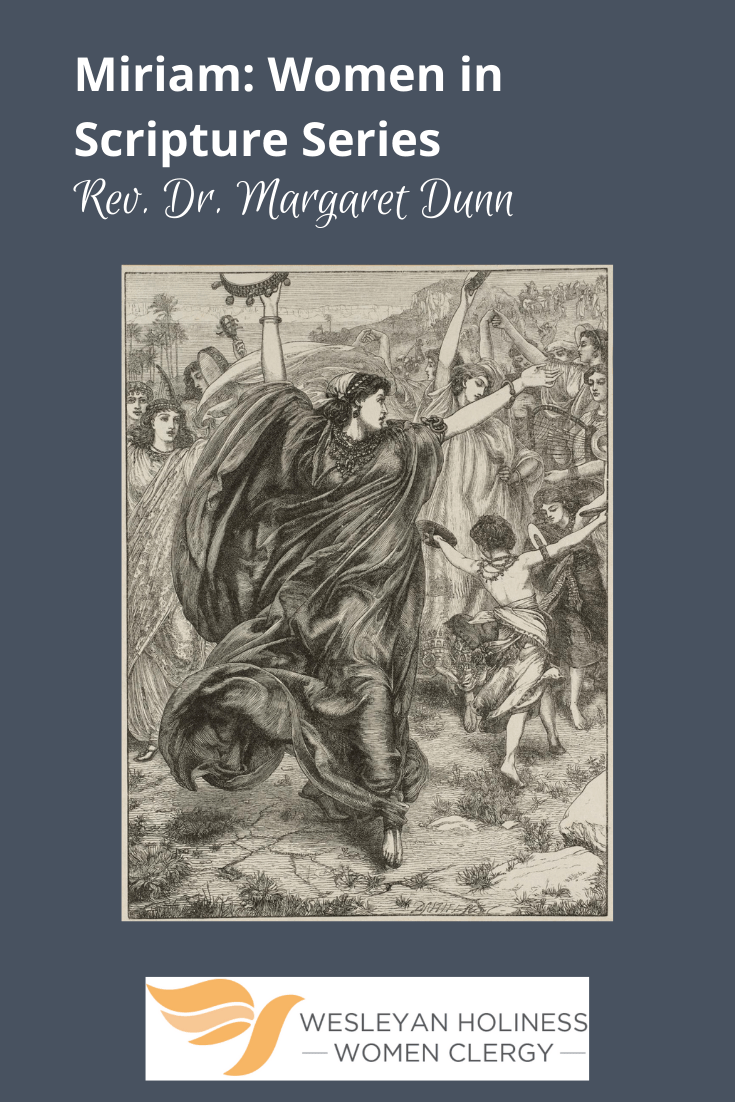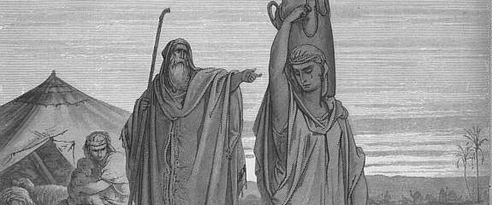As an older sister, I have been thinking about what it must have been like for Miriam to be the older sister of Moses. Then I began to ponder what we can learn about being an older sister from Miriam.
Miriam Watches Moses Exodus 2:1-10
We meet Miriam in Exodus 2 when she is watching her 3 month old brother, Moses, being rescued from the Nile River. She was given the task of watching to see what would happen to her brother. She sees the daughter of Pharaoh find him and take him from the water. She then asks the daughter of Pharaoh if she would like her to find a Hebrew woman to take care of the baby. When Pharaoh’s daughter says yes, Miriam goes and finds their mother to take care of the baby until he is three years old. At this point in time Miriam was probably young and was very brave. She would also watch her brother grow until the age of three and then be returned to Pharaoh’s daughter.
We do not read about Miriam again until Exodus 15:20-21. I can only imagine what she must have been thinking and feeling as she watched Moses grow up in Pharaoh’s home, go into exile after killing an Egyptian, then return, only to encounter Pharaoh, and go through the ten plagues and the Exodus from Egypt which was led by her brothers, Moses and Aaron.
What was that like for Miriam? She had endured the suffering of her people in Egypt and watched from the sidelines as God delivered His people. She was now seeing the brother she had helped at birth, deliver her people.
Did she remember when the midwives did not kill the babies born to the Israelites like Pharaoh had commanded? Did she remember when that was happening how her mother and father had disobeyed Pharaoh’s edict and kept Moses alive? Was she nervous about going into the unknown land but confident that God’s leader Moses would lead them to freedom? Was she proud of her two brothers for being bold enough to stand before Pharaoh and be the voice of God? Did she stand in amazement as the Red Sea parted and they crossed over it and then watched the army of Pharaoh be destroyed as the waters merged again?
Miriam Leads in Worship Exodus 15:20-21
When we next read about her, we read -
“Aaron’s sister Miriam was a prophet. She took a tambourine in her hand.
All the women followed her. They played tambourines and danced.
Miriam sang to them,
‘Sing to the Lord.
He is greatly honored.
He has thrown Pharaoh’s horses and chariot drivers
into the Red Sea.’ “ (Exodus 15:20-21 NIRV).
It is interesting that she is identified in this passage as Aaron’s sister and as a prophetess. The NASB reads “Miriam the prophetess, Aaron’s sister.”
We also see that she is followed by all the women. Did they follow her because she was Moses’ and Aaron’s sister or because she was a leader before the Exodus?
It is also interesting that Micah 6:4 says that Moses, Aaron, and Miriam delivered the people from Egypt. What can be said is that in Exodus 15 she led the women in praise of God’s deliverance. We also know that the song she sang was one of the first songs of praise for the Israelites.
Miriam is identified as a prophetess, a role held by only a few women in the Old Testament and she was the first one. “Others called a “prophetess” are Deborah (Judges 4:4), Huldah (2 Kings 22:14), Isaiah’s wife (Isaiah 8:3), Anna (Luke 2:36), and Philip’s four daughters (Acts 21:9).”
(https://www.gotquestions.org/Miriam-in-the-Bible.html) What was she thinking and feeling as she led the women in singing? What did it feel like to be the older sister of Moses as he led the people?
Miriam Complains about Moses Numbers 12:1-2
Our next meeting with Miriam comes in Numbers. The people have been wandering for many years.
“Then Miriam and Aaron spoke against Moses because of the Cushite woman whom he had married (for he had married a Cushite woman); and they said, ‘Has the Lord indeed spoken only through Moses? Has He not spoken through us as well?’ And the Lord heard it.“(Numbers 12:1-2 NASB).
Miriam and Aaron fell into a spirit of complaining or questioning God. The complaints centered on the marriage of Moses to a non Hebrew woman and the fact that Moses was the youngest of the three siblings. God’s punishment was swift as Miriam was struck with leprosy. Aaron intercedes and she is healed after seven days. She is kept in isolation for seven days and then the days of traveling begin again. One author says this about this incident
“As Miriam’s leprosy convicted Aaron of the foolish words they had spoken against God’s chosen servant, it should also remind us not to judge those around us or live in jealousy when God has given a specific call to someone else (see Titus 3:1–15; James 1:26; 4:11–12; Ephesians 4:31; Philippians 4:8). Miriam had an opportunity to show the people of Israel what it meant to live in love as a servant of God without complaining, and, for most of her life, she did; but she failed in the matter of Moses’ wife.“ (https://www.gotquestions.org/Miriam-in-the-Bible.html).
Miriam’s Death Numbers 20:1-2
After wandering for forty years, we meet Miriam last in Numbers 20:1-2. In this passage, she dies and is buried. She would not see the Promised Land but had spent a great part of her life, leading the people in their years of wandering alongside her brothers Moses and Aaron. She died in a waterless place and the people were complaining.
I found it interesting that when Miriam is introduced there was lots of water and when she died there was none. It was soon after her death that the episode at Meribah is recorded and Moses is told he will not enter the Promised Land, then shortly after this Aaron dies and is buried.
What Can We Learn
There are many things that we can learn from Miriam.
The biggest lesson for me is that God’s way is best and I shall not murmur.
The only negative picture from Miriam’s life is when she complained in Numbers 12. All the other times she was a supportive, brave, courageous and daring big sister and perhaps was also a bit proud of her younger brothers. The song poet C.W. Naylor penned these words
God’s way is best, I will not murmur,
Although the end I may not see;
Where’er He leads I’ll meekly follow,
God’s way is best, is best for me.
Miriam’s life shows me what happens when I am tempted to complain about anyone and particularly about those God has anointed for leadership.
Miraim’s life shows me that family is important and that we can draw strength from our families. Miriam’s courage saved Moses’ life when he was an infant.
Aaron’s prayer to God for her deliverance did not take away the punishment but it did mean that she lived. Loyalty is important in our families and leadership teams or families. Together Moses, Miriam, and Aaron led God’s people in the Exodus. What does that tell us about the importance of teams and having teams of women and men?
As you ponder Miriam’s life, what lessons do you learn? How does her life speak to you as a sister if you have siblings? How does her life demonstrate that God uses teams of people to accomplish His mission?
References
https://www.christiansong-lyrics.com/charles-wesley-naylor-profile-and-list-of-gospel-hymns/
https://www.womanofnoblecharacter.com/miriam-in-the-bible/
https://www.ospreyobserver.com/2017/12/heroic-women-of-the-bible-miriam-the-original-big-sister/
https://jwa.org/encyclopedia/article/miriam-bible
https://www.gotquestions.org/Miriam-in-the-Bible.html
http://womeninthebible.net/women-bible-old-new-testaments/miriam/

